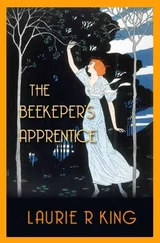J. Janes - Beekeeper
Здесь есть возможность читать онлайн «J. Janes - Beekeeper» весь текст электронной книги совершенно бесплатно (целиком полную версию без сокращений). В некоторых случаях можно слушать аудио, скачать через торрент в формате fb2 и присутствует краткое содержание. Год выпуска: 0101, Издательство: MysteriousPress.com/Open Road, Жанр: Исторический детектив, на английском языке. Описание произведения, (предисловие) а так же отзывы посетителей доступны на портале библиотеки ЛибКат.
- Название:Beekeeper
- Автор:
- Издательство:MysteriousPress.com/Open Road
- Жанр:
- Год:0101
- ISBN:нет данных
- Рейтинг книги:4 / 5. Голосов: 1
-
Избранное:Добавить в избранное
- Отзывы:
-
Ваша оценка:
- 80
- 1
- 2
- 3
- 4
- 5
Beekeeper: краткое содержание, описание и аннотация
Предлагаем к чтению аннотацию, описание, краткое содержание или предисловие (зависит от того, что написал сам автор книги «Beekeeper»). Если вы не нашли необходимую информацию о книге — напишите в комментариях, мы постараемся отыскать её.
Beekeeper — читать онлайн бесплатно полную книгу (весь текст) целиком
Ниже представлен текст книги, разбитый по страницам. Система сохранения места последней прочитанной страницы, позволяет с удобством читать онлайн бесплатно книгу «Beekeeper», без необходимости каждый раз заново искать на чём Вы остановились. Поставьте закладку, и сможете в любой момент перейти на страницу, на которой закончили чтение.
Интервал:
Закладка:
‘One name,’ he said, and she, like him, watched the flame splutter to life. ‘There are well over forty in this book of your husband’s, madame. My partner and I have little time. I think you know the one we need.’
‘I don’t. I haven’t seen that book in …’
‘Then why, please, did you take it?’
‘Did I look through it — is that what you’re implying?’
‘You know it is.’
‘Then I must tell you I saw nothing untoward.’ There, she had him now.’ Defeated, he picked up one of the tiny Plasticine sculptures of ducks, pigs, geese and horses, too, in the farmyard Étienne had made at the age of four and which she had saved all these years.
‘Beautifully done,’ he said.
‘Please don’t touch them. You’ve no right.’
‘Is it that you want me to obtain a magistrate’s order? It will take much time, but if you have nothing to hide, why imply that you have?’
Salaud ! she cried inwardly and swiftly turned away.
‘Sixteen, madame. Why did your son feel he’ had to leave this house at such a tender age?’
Tender … ‘It has nothing to do with my husband’s murder! Nothing, do you understand? He … he simply couldn’t stand seeing what was happening to me.’
There were photographs of the boy with his mother in happier times, some of the sister, too. In one snapshot, the two youngsters, at the ages of perhaps twelve and eight, were shyly holding hands at the water’s edge; in another the boy was moulding river clay into a pregnant female form. In yet another, he and his mother were fondly embracing.
‘One always looks for answers, madame. You must forgive the detective in me.’
Had he seen something? she wondered and looking up, knew at once that he was now watching her closely in the mirrored door of the armoire and had positioned himself so as to do so.
‘Is there anything else you want?’ she asked harshly.
‘The watercolours, madame. Your son is also an accomplished painter. Very sensitive, very accurate. Lupins, achillea, dogwood in flower, roses, but …’
‘But, what ?’ she spat.
He shrugged and parted the black-out drapes to peer down into the garden and then to pull them aside. ‘But in your husband’s study, madame, there are those of Pierre-Joseph Redouté and others. Un bouquet de pensées, Rosa x odorata, lilium superbum …’
‘And?’she shrilled defiantly.
‘But none of your son’s work. It’s a puzzle, isn’t it?’
Pinching out the flame, St-Cyr heard her suck in a wounded breath and stammer, ‘I … I never do that. Not … not until the candle’s burned out.’
‘Then let us hope your prayers will be answered.’
Wax and candles and a sister in the Salpêtrière. Acarine mites from Russia … Old Shatter Hand hadn’t given them a hell of a lot to go on, thought Kohler, finishing a cigarette while standing next to a newspaper kiosk inside the Gare de l’Est.
People were everywhere; uniforms, too, the smell of boot grease, sweat and urine mingling with those of cheap cologne, unwashed bodies, stale tobacco smoke, farts and all the rest. Jesus, merde alors , why did the French have to make their railway stations so huge?
High above him, the glass-and-iron dome of the roof was lathered with regulation laundry blueing, each pane criss-crossed with brown sticking-paper, but now daylight fought to get in to discolour everything in this perpetual gloom. More than thirty platforms fed lines to and from Eastern France, the Reich and Switzerland. It was from here that trainload upon trainload of goods left the country. Fully 80 per cent of the country’s wheat, nearly all of its potatoes, eggs, cheese, wine, copper, lead, zinc and steel. There were goods-sheds upon sheds in the yards to the north of the station, warehouses upon warehouses. So how the hell did honeycomb from Russia bypass the Reich to find its way into this, and where was it being kept?
Tucking the cigarette butt away in his mégot tin for another day — a real butt collector like everyone else — Kohler took a moment longer to look around.
People came and went or milled about in their thousands, or joined seemingly endless queues at the controls which solidly blocked the traffic up. Some had burlap sacks of onions — firewood even — on tired, worried shoulders. Others lugged suitcases — the better dressed, their briefcases. A crate of carrots, one of cabbages — artichokes in a hamper that was stuffed to the limit. Sacks empty, on occasion, and oh, bien sûr , it was a city and a nation on the scrounge and most here had been out foraging the countryside or were on their way to it. And those returning with the spoils had to face the lottery of the controls.
Paris had become a city of police and nowhere did one see this better than in places like this. The flics in their dark blue capes and képis patrolled endlessly looking for trouble or just being damned officious to show that they still had some power. The Feldgendarmen, the military police, in field-grey greatcoats and with badges of office that looked like miniature breastplates dangling from the neck, were here in force. The Kettenhunde , they were called behind their backs: the chained dogs. They, too, carried black leatherclad, lead-weighted truncheons.
Gestapo … there were lots of those and invariably they carried thin briefcases and looked like down-at-the-heel undertakers who’d had a bad year. But the Wehrmacht had its plain-clothed secret police, too: the GFPs, the Geheime Feldpolizei, on the hunt primarily for deserters.
And wasn’t this matter of the mites a question for the railway police? he asked himself and said, Go carefully. Remember that these days there has to be a system for every commodity.
The Reichsbahn supervised the railways, so he’d have to go to them. But in France they didn’t wear the becoming light blue-grey they did at home. Here they wore coal black with silver piping on their tunics. Swastikas and eagles also, of course.
Where … where the hell to start? Soldier-boys were everywhere, arriving and departing, laughing, shouting, crying, too, as they kissed their girls goodbye. There were boys from the Kreigsmarine and also from the Luftwaffe, for Paris was Mecca to all and probably the closest one could get to how things had been before the war — no bombing; well, hardly any. Rest and recupe’ and this really was the Führer’s little showcase of how the Occupied should behave.
Good luck then, mein Führer, he snorted inwardly at the thought of what wasn’t so easily seen, that vast undercurrent of dissent and deceit that would one day erupt into outright hatred.
When he found the appropriate office, a burly Bahnschutzpolizei corporal from Schwaben was standing guard over a bench filled with kids. Some were young, others older, but all had dutifully crossed their knees. Books were open on each of their laps — one, two, three, four, five in all. Scruffy shoes needed mending, mismatched kneesocks drooped, and all were obviously from the same family, for a mismatched sock found its mate well down the line …
Would a sweet voice help? ‘ Guten Morgen , Herr Offizier. A moment, bitte. I seem to be lost.’
Suspicious blue eyes raked him savagely. ‘Lost? Don’t give me that crap! Gott im Himmel, mein Schweinebulle , since when was a cop ever lost?’
Was he really that easy to spot? wondered Kohler, somewhat taken aback. ‘Okay, I’m looking for something.’ Affably he grinned and offered a cigarette as a token of peace.
The packet was taken in expectation of more to come. The kids didn’t look up. A page was turned and then another and on down the line.
It would be best to get it out and over with. ‘A railway truck in from Russia recently. Honey or beeswax.’ He gave a futile shrug. ‘My boss wants to know.’
Читать дальшеИнтервал:
Закладка:
Похожие книги на «Beekeeper»
Представляем Вашему вниманию похожие книги на «Beekeeper» списком для выбора. Мы отобрали схожую по названию и смыслу литературу в надежде предоставить читателям больше вариантов отыскать новые, интересные, ещё непрочитанные произведения.
Обсуждение, отзывы о книге «Beekeeper» и просто собственные мнения читателей. Оставьте ваши комментарии, напишите, что Вы думаете о произведении, его смысле или главных героях. Укажите что конкретно понравилось, а что нет, и почему Вы так считаете.












